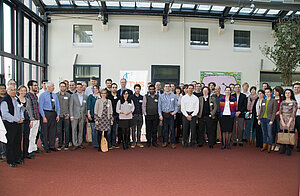program retrospect
| Abstract (A) | speaker | affiliation | title |
|---|---|---|---|
Stephan | Würzburg | SPG7 - an example of genotype-phenotype correlation | |
Beate Winner | Erlangen | HSP disease modeling using induced pluripotent stem cells | |
Rebecca | Miami | Functional electrical stimulation for HSP therapy – a randomized clinical trial | |
Matthis | Tübingen | Exergame training improves motor performance in children with degenerative ataxia: clinical benefits and underlying mechanisms | |
Giorgio | Milan | Spinocerebellar ataxia type 28, from molecular hypothesis to preclinical treatment | |
Stephan | Berlin | Polyamines rescue from age-induced memory impairment | |
A | Mukhran | Jena | Modelling complicated spastic paraplegia in mice |
Jennifer | Cambridge | Adaptor protein complexes and HSP | |
Evan | Cambridge | Tubules, microtubules and axonal degeneration | |
Janos | Würzburg | Neuroinflammation accompanying glial mutations: pathogenetic aspects and similarities to progressive multiple sclerosis | |
Joachim | Aachen | Neuropathology of the endoplasmic reticulum in neurodegenerative and neuromuscular disorders | |
Elina | Helsinki | Seipinopathy and lipid imbalance | |
Craig | Betheshda | Converging mechanisms of SPG-mutated ER shaping proteins in lipid droplet biogenesis | |
Elena | Cologne | Mitochondrial transport, tau, and axonopathy |




